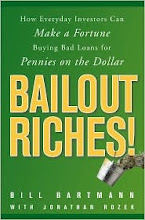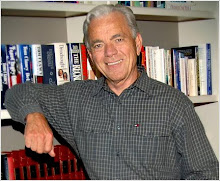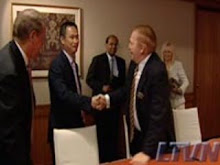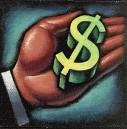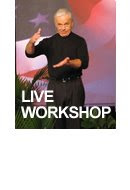BY SCOTT S. SMITH
Bill Bartmann is worth hundreds of millions of dollars—and most people have never heard of him. It is quite possible that this entrepreneur started off with less and has overcome more than any other person to appear on the Forbes 400 list. After the roller coaster of events that have defined his career, Bartmann started the Billionaire Business School. His seminars and workshops aim to show people that they, too, can follow in his footsteps, regardless of how much money they have or any obstacles that may stand in the way.
Bartmann was one of eight children, born to a father who never earned more than $6,000 a year as a janitor and a mother who cleaned houses in an attempt to make ends meet. Lining up each month to receive government food handouts was a common family trip. They moved often in his first 14 years, and several of the houses were condemned as unfit for human habitation.
At 14, Bartmann left his family. He joined a street gang, got rejected by the Marines and joined a traveling carnival. This was followed by a string of low-wage jobs that included logging, laying sod and washing cars. Things were not looking good.
Then, the real bad luck started. When Bartmann was 17, he came home intoxicated one night and fell down a flight of stairs, paralyzing him from the waist down. Although the doctor said he would never walk again, Bartmann was determined to prove him wrong. Five months of hard work and determination later, he walked out of the hospital on his own two feet.
“Sometimes you need a negative motivator to build your self-esteem,” Bartmann says. He explains that if you have a positive self-image, you can separate specific failures from who you really are. “Any failure can be overcome if you don’t over-generalize it,” he says. “You have to see it as something that happened to you. It doesn’t determine your real value. The main cause of failure is the inability to deal with self-doubt.”
Bartmann emphasizes the idea that you have to work hard for something rather than just sit around and wish for it. Case in point: He took the high school graduation equivalency test, put himself through college and, in 1975, graduated from law school. After practicing law for five years, he started his first company, in real estate development, which gave him the experience he needed for his foray into oil and gas drilling.
Bartmann’s first big break came in the mid’80s when, at the request of a local bank in Muskogee, OK, he took over bankrupt Hawkeye Pipe Services, a pipe manufacturer for oil rigs. He told the bank the business was still viable, got funding for it, and under his leadership, the company had sales of $1 million a month. Then, in October 1985, with the OPEC oil cartel in disarray, prices fell dramatically. Bartmann was forced to close the company and left with $1 million in debt.
Soon after, creditors were hounding Bartmann at all hours, demanding payments and threatening lawsuits and re-possession of his car. He was committed to repaying the debt and, with help from his former chief operations officer, began scanning business opportunity ads. They noticed the FDIC was auctioning off delinquent loans. It sounded like throwing good money after bad, but they went to the auction anyway—sticking to back roads because they didn’t have the 40 cents for the Interstate toll.
While inspecting the 200 bad loans, it occurred to Bartmann there might be a way to collect the money. He was eager to veer as far away from the strategy of intimidation—an approach that had been applied to him in the past—as possible. “Meanness not only wasn’t fair, it wasn’t productive,” he says. He persuaded a bank to lend him and his partner $13,000 and ended up with a return of $64,000.
Soon after, Commercial Financial Services was born. Bartmann continued using the nice-guy approach to collect small credit card debts. CFS bought debt outright, giving customers flexibility in the amount they would need for settlement and how much time they could take to pay.
Bartmann was able to improve his cash flow with another innovation: bundling loans and securitizing them into bonds, which received A ratings from Standard & Poor’s index. In September 1998, he appeared on the cover of Inc. magazine with the headline, “The Billionaire Nobody Knows.” At the time, the privately held company was estimated to be worth anywhere from $3 billion to $5 billion, owned primarily by Bartmann and his wife, Kathy, and had 3,900 employees.
The following month, trouble hit. He learned that a business partner had embezzled millions of dollars, and as soon as the accusation of fraud was made, the bonds became liabilities. By July 1999, Bartmann declared bankruptcy. “When sharks smell blood in the water, it’s too late,” he says of the collapse.
The misfortune did not end there. In December 2002, Attorney General John Ashcroft indicted him for fraud, even though his partner said Bartmann had no knowledge of the embezzlement. But it was the heyday of corporate mismanagement scandals, and the government didn’t want to be accused of overlooking any offenders. By the time he was cleared of all charges a year later, Bartmann had spent $4.5 million to defend himself and investigate what had happened at CFS.
“I’m not bitter because look at what I still have,” he says, referring to not only money in the bank, but also his wife, two daughters and two grand-kids—whom he brings up on stage at his presentations. “This is what success is really about,” he tells audiences at his Billionaire Business School seminars, which drew 280,000 attendees in 2007.
Bartmann says that most people simply do not have basic business management skills, which is why the failure rate of small companies is so high. His mission is to combat this problem, recently launching Billionaire U, which off ers online courses for just $100 a year. His website had a million hits last year, but he expects the new low price to attract 10 times that many this year.
As Bartmann puts it, “I’m not making as much money as I did with my last company, but I’m having a lot more fun.”
Tuesday, January 20, 2009
Subscribe to:
Comments (Atom)


